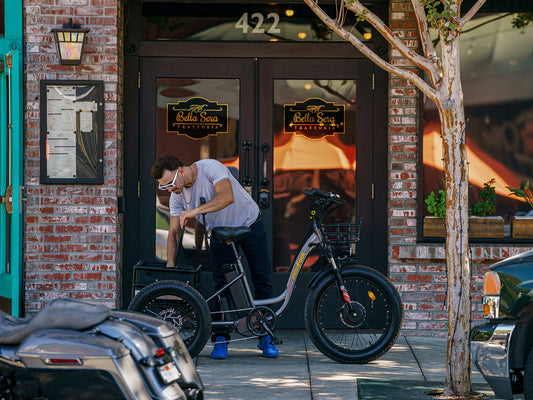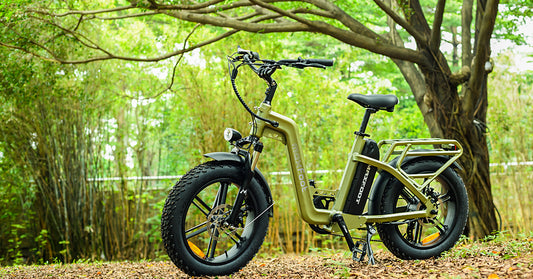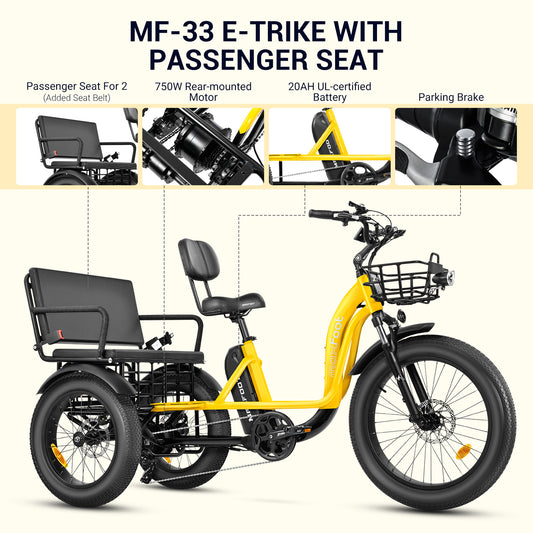The Big Apple, known for its bustling streets and busy urban life, has long been a city that thrives on the convenience of mass transit. However, in recent years, an increased interest has been seen in sustainable and eco-friendly transportation options.
eBike is a seemingly perfect solution to combat the city's notorious traffic congestion and reduce carbon emissions. But is the eBike a viable way of urban transport in New York City?
Let's explore the eBike's potential as a practical alternative and examine how it could revolutionize the urban landscape.
The Rise of the eBike
The electric bike or eBike is a hybrid between a traditional bicycle and an electric motor, providing pedal assistance to the rider. This new technology has made cycling more accessible to a wider range of people, including those who may have been deterred by the physical demands of traditional cycling.
In recent years, eBike sales have skyrocketed. In the US alone, 500,000 bike units were sold in 2021, and the Light Vehicle Association predicts that number will reach a million in just a couple of years. As of 2023, the global Ebike market stands at 31.9 billion dollars. It is projected to reach 62 billion dollars by 2030 with a year-on-year growth rate of 10%.
Adapting to New York City's Streets
New York City's dense traffic and limited parking spaces present a unique challenge to any form of transportation. However, eBikes offer several benefits that make them well-suited for urban living.
Their lightweight design, compact size, and maneuverability enable riders to navigate through congested streets with ease. So, they can bypass gridlocks that plague traditional vehicles. Additionally, electric bikes can be parked in smaller spaces and also foldable ones can be carried on public buses. This alleviates the demand for scarce parking spots.
One particular eBike model that will gain traction in New York City is the Maxfoot MF-19. This 1000W electric folding bike features fat tires and full suspension, making it an ideal choice for city dwellers seeking both performance and convenience. The MF-19's compact design allows for easy storage, while its powerful motor and extended range make it a formidable option for daily commutes.
Being a full-suspension foldable electric bike, it guarantees both comfort and convenience. The full suspension allows you to travel across different city terrain while its foldability makes it portable and easy to store.
Environment and Health Benefits
Embracing eBikes as a primary mode of transportation contributes to a reduction in carbon emissions and air pollution, improving overall air quality in the city.
As eBikes rely purely on electric power, they generate zero tailpipe emissions, unlike their gas-guzzling counterparts. Furthermore, increased eBike usage has the potential to decrease the city's dependence on fossil fuels, promoting a more sustainable and environmentally conscious urban lifestyle.
Besides environmental benefits, eBikes also offer numerous health benefits for riders. Ebikers get to practice cycling during their city rides.
Cycling is a low-impact aerobic exercise that helps improve cardiovascular health, muscle strength, and overall well-being. With electric-assisted cycling, eBikes encourage more people to embrace an active lifestyle, ultimately promoting better public health.
Infrastructure and Legal Considerations
To support the growing popularity of eBikes, New York City has been investing in cycling infrastructure. As of 2021, the city has over 1,456 miles of bike lanes, and the NYC government plans to add more since the bicycle community is continuously increasing over the past few years.
The infrastructure is likely there due to the city’s largest bike-sharing program, Citi Bikes, and the NYC initiative, Green Wave Program. This program is intended to make New York a safe place for the cycling community and prevent fatal injuries.
However, there are some legal challenges that eBike riders need to be aware of. New York City has strict regulations governing eBike usage, particularly around speed limits and classifications. EBike riders need to be familiar with these regulations to avoid fines or legal issues.
Affordability and Accessibility
While eBikes can be more expensive than traditional bicycles upfront, they offer long-term cost savings in comparison to car ownership. When factoring in fuel, insurance, and maintenance costs, eBikes present an affordable alternative for urban commuters.
Moreover, the cost of eBikes has been steadily decreasing due to advances in technology and increased demand, making them a more viable option for a wider range of budgets. As the market continues to grow, eBikes will likely become even more affordable and accessible to New York City residents.
Safety Concerns and Public Perception
One of the challenges faced by the eBike community in New York City is addressing safety concerns and public perception. As eBikes are relatively new to the urban landscape, some residents may view them with skepticism, associating them with increased risk on the roads. However, studies have shown that eBikes do not pose a significantly higher risk compared to traditional bicycles, and their increased visibility may even contribute to improved safety.
The riders also have a responsibility on their part to wear all safety gear while riding, ride in specialized bicycle zones and adhere to the pace limits defined by city authorities.
To further enhance the safety of eBike riders, the city must invest in continued improvements to cycling infrastructure, as well as public education campaigns promoting safe cycling practices. These efforts can help to dispel misconceptions and foster a more positive public perception of eBikes as a viable mode of urban transportation.
The Future of eBikes in New York City
Taking into account the numerous benefits that eBikes offer in terms of sustainability, health, affordability, and adaptability to the city's streets, it is clear that they have the potential to become a major player in New York City's transportation landscape.
As long as NYC continues to invest in infrastructure and address legal and safety concerns, eBikes are poised to revolutionize urban commuting in the Big Apple.
By embracing modern eBikes, such as the Maxfoot MF-19, New York City residents can look forward to a greener and more efficient future, making the city an even more attractive and enjoyable place to live and work.




